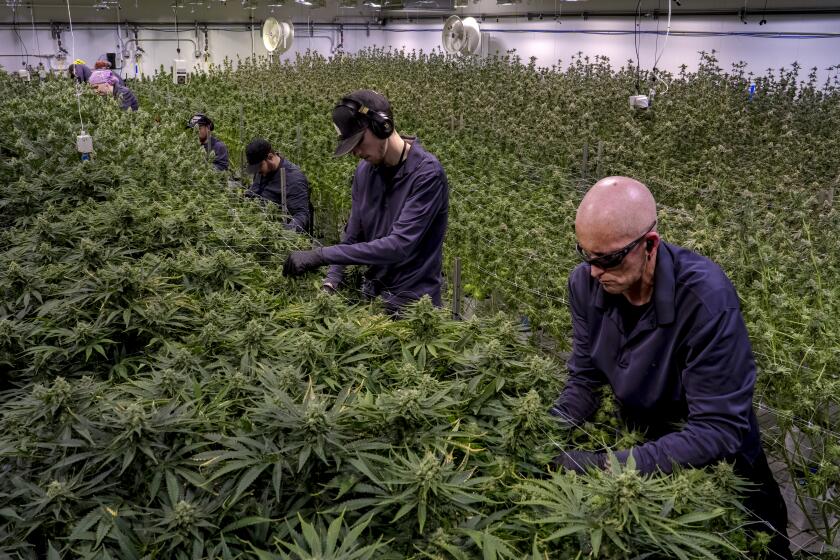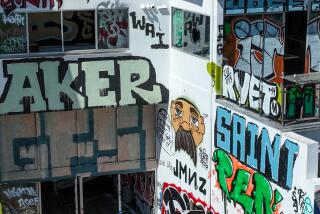L.A.’s silliest law? Why Hollywood bans Silly String on Halloween

- Share via
- Silly String is prohibited in Hollywood’s public places from 12:00 a.m. on Oct. 31 to 12:00 p.m. on Nov. 1. Violators face up to six months in jail and $1,000 in fines.
- In years past, Silly String caused thousands of dollars in property damage, leaving thick goo coating cars and the famed Hollywood stars.
- Across the U.S., messy and costly Silly String incidents have spurred property owners and law enforcement to call on legislative representatives to act.
To hear police and locals tell it, Halloween in Hollywood two decades ago was out of control, with revelers routinely spraying and damaging property with a product deemed such a menace it has since been seasonally outlawed: Silly String.
Thin plasticine strands stripped the sheen off sports cars parked on the street. Not even the famed Hollywood Walk of Fame stars were immune to the rainbow-hued goo.
The string hit the fan in the early 2000s, when police say particularly sticky Halloween celebrations left Hollywood property owners with about $200,000 in annual cleanup and recovery costs.
“On a typical Halloween night, up to 100,000 people come to Hollywood Boulevard,” the Los Angeles Police Department said in a news release three days before Halloween 2004. “Hundreds of illegal vendors flock to the street and sell Silly String which then becomes the sole source of entertainment for the night.”
Fed up after nearly a decade of String-scraping, the city of Los Angeles approved restrictions that August that remain in place today. Under the ordinance, Silly String is prohibited in Hollywood’s public places from 12:00 a.m. on Oct. 31 to 12:00 p.m. on Nov. 1. Violators face up to six months in jail and $1,000 in fines.
For years, city Department of Transportation employees have posted red-and-white municipal signs along Hollywood Boulevard and other major streets in the days leading up to Halloween, declaring in bold carmine letters: “It is ‘ILLEGAL’ to possess, use, sell or distribute silly string in public areas.”
Between 2009 and May 1, 2022, the LAPD arrested one person and issued zero citations for violating the Hollywood Halloween ban, according to public records provided to The Times. A spokesperson for the department declined to provide comment for this story.
While the brand name is often used as a catchall for any number of similar products, the Hollywood ban defines Silly String as “any putty-like substance that is shot or expelled in the form of string from an aerosol can or other pressurized device.”
The Los Angeles County Board of Supervisors approved a motion that calls on several popular websites ‘to voluntarily cease advertising illegal cannabis dispensaries.’
Silly String was accidentally discovered in 1972 by two scientists attempting to develop a sprayable cast for broken limbs. The puffy product rose to prominence through the 1990s, eventually becoming ubiquitous in toy stores around the world.
With the novelty’s popularity came a rise in partyers, teenage scofflaws and protesters wreaking Silly destruction. In city after city, messy, costly incidents spurred property owners and law enforcement to call on legislative representatives to act.
Hollywood isn’t the only place where politicians have moved to stem a Silly String scourge. At the federal level, the EPA monitors it and similar products and has forced major retailers to pull “illegally imported confetti string products that contain banned hydrochlorofluorocarbons” from their shelves.
Last year, Beverly Hills passed an ordinance banning people under 21 years old from having Silly String — or shaving cream or hair removal gel — in public on Halloween.
A New Jersey village banned the stuff in 1998, after a particularly String-soaked Independence Day parade. A decade earlier, Marlborough, Mass., passed an ordinance banning “any instrument or product designed to project a string or streamer of plastic material,” a.k.a. Silly String.
In 1996, a Connecticut town instituted a ban on Silly String at carnivals, parades and other public events, punishable by a fine of up to $99. The ordinance was approved after Silly String sprayed during a parade at a local apple harvest festival “discolored cars, stained clothing and instruments, and almost caused two police officers in the parade to lose control of their motorcycles,” according to the Hartford Courant.
There’s no evidence that Silly String ever caused any LAPD motorcycle cops to wreck their hogs while weaving between drunken vampires and mermaids on Hollywood Boulevard. But L.A.’s statute notes that the ban was necessary because Silly String “may cause pedestrians and police officers on horseback or motorcycles to slip and fall.”
Some locals are skeptical.
“I’ve never seen it,” Julio Suarez, 33, said as he smoked a cigarette outside the building on Hollywood Boulevard where he’s lived for three years. “Silly String? Why would that even become an issue?”
The cops keep asking the city to put up anti-Silly String signs every October, even as some officers question whether it’s still necessary.
“We haven’t seen Silly String in years!” an LAPD sergeant wrote in an email to a city Department of Transportation engineer three days before Halloween in 2021. “But yes. Let’s put them up just in case.”
A comparison of Michigan and California shows how one state can have a booming cannabis economy while another’s still feels like a pipe dream.
Silly String is no longer in as widespread use as it was one or two decades ago, although some non-party applications have emerged. The U.S. military has used Silly String to detect improvised explosive devices, or IEDs, on the battlefield, relying on the foam to cling to tripwires that would otherwise be invisible.
Some towns, including Lodi in San Joaquin County, are reconsidering bans hastily instituted years ago.
Larry Williams, a security guard who was working on Hollywood Boulevard one recent evening, said he hadn’t thought of Silly String since he was a teenager. But now that he knows Hollywood has banned it, his interest is piqued.
“Now I might go get some Silly String for Halloween,” he said, laughing.
One man who sat on a low chair outside the Hollywood La Brea Inn on a recent evening said he is a native of the neighborhood. He introduced himself as Dave and declined to give his last name, saying there was a time when Silly String damage was actually a pretty serious concern to some in Hollywood.
“It’s not like it used to be,” he said. “They don’t spray it all over the [Hollywood] stars anymore.”
Whether due to climate concerns, municipal bans or just the way fads work, it seems the product has fallen out of favor. But according to Dave, Silly String is still readily available in Hollywood — if you know where to look.
“They just put up the signs,” he said of the city. “But all the stores still sell it.”
More to Read
Sign up for Essential California
The most important California stories and recommendations in your inbox every morning.
You may occasionally receive promotional content from the Los Angeles Times.












